PRODUCT INFORMATION
Fabrics
- Organic Cotton
 Experts estimate that between one fourth and one third of a pound of pesticides are used in the production of a single cotton t-shirt. Three quarters of a pound of pesticides are used to produce a standard pair of jeans. Since cotton is not considered a food crop, there are few regulations on how often it can be treated with pesticides, herbicides and other environmentally destructive chemicals. Organically grown cotton is cotton that is produced without the use of pesticides, herbicides, or chemicals. It is gentler on our rivers and streams, birds, insects and the farmers who cultivate it. For more detailed information on the benefits of wearing and buying organically grown cotton, please visit these sites.
Experts estimate that between one fourth and one third of a pound of pesticides are used in the production of a single cotton t-shirt. Three quarters of a pound of pesticides are used to produce a standard pair of jeans. Since cotton is not considered a food crop, there are few regulations on how often it can be treated with pesticides, herbicides and other environmentally destructive chemicals. Organically grown cotton is cotton that is produced without the use of pesticides, herbicides, or chemicals. It is gentler on our rivers and streams, birds, insects and the farmers who cultivate it. For more detailed information on the benefits of wearing and buying organically grown cotton, please visit these sites.
- Hemp
 The first flag of the United States was made from hemp! Hemp is a very resilient plant that thrives naturally without the use of pesticides or chemicals, making it a great alternative to cotton for fiber production. Until the 1880s, more paper products were made from hemp than any other source. Since hemp is a quick-growing crop, it is much more efficient for paper products than trees. Both George Washington and Thomas Jefferson grew hemp. Industrial hemp contains very low levels of the drug THC. It is impossible to get high from smoking industrial hemp. However, since the plant looks very similar to the high-THC varieties used for marijuana, the U.S. has banned hemp farming. All of the hemp fibers in our products are imported (though many of our garments are sewn in the USA). For more hemp facts check out:
Garments from 100% hemp have a look and feel similar to linen. Hemp fabrics are extremely durable and very easy to care for; they can be machine washed and dried without worry. The fabric isn't as soft as cotton, soy or bamboo, but it wears in nicely over time and will last for years. There are several all-natural fabric softeners on the market that can also help break-in your hemp clothing more quickly to a soft, easy-wear feel. Hemp is often blended with a second fabric such as organic cotton to get a garment that is much more durable than pure cotton while being significantly softer with a smoother drape than pure hemp.
The first flag of the United States was made from hemp! Hemp is a very resilient plant that thrives naturally without the use of pesticides or chemicals, making it a great alternative to cotton for fiber production. Until the 1880s, more paper products were made from hemp than any other source. Since hemp is a quick-growing crop, it is much more efficient for paper products than trees. Both George Washington and Thomas Jefferson grew hemp. Industrial hemp contains very low levels of the drug THC. It is impossible to get high from smoking industrial hemp. However, since the plant looks very similar to the high-THC varieties used for marijuana, the U.S. has banned hemp farming. All of the hemp fibers in our products are imported (though many of our garments are sewn in the USA). For more hemp facts check out:
Garments from 100% hemp have a look and feel similar to linen. Hemp fabrics are extremely durable and very easy to care for; they can be machine washed and dried without worry. The fabric isn't as soft as cotton, soy or bamboo, but it wears in nicely over time and will last for years. There are several all-natural fabric softeners on the market that can also help break-in your hemp clothing more quickly to a soft, easy-wear feel. Hemp is often blended with a second fabric such as organic cotton to get a garment that is much more durable than pure cotton while being significantly softer with a smoother drape than pure hemp.
- Tencel
 Tencel is a brand name for the generic fiber lyocell. It is man-made from cellulose extracted from trees that are managed on land unsuitable for food crops or grazing. The production of Tencel is extraordinarily clean, and the fabric has been awarded the European Union's Eco-label. The fabric is breathable, and feels very soft like a combination of silk and suede. Tencel can be machine washed. For further details on Tencel, please visit:
Tencel is a brand name for the generic fiber lyocell. It is man-made from cellulose extracted from trees that are managed on land unsuitable for food crops or grazing. The production of Tencel is extraordinarily clean, and the fabric has been awarded the European Union's Eco-label. The fabric is breathable, and feels very soft like a combination of silk and suede. Tencel can be machine washed. For further details on Tencel, please visit:
- Lenzing-Fastern (the makers of Tencel)
- EU Eco-label
- Bamboo
 Bamboo is the fastest growing woody plant on earth. The most common species grows at the whopping rate of 1-2 inches per day, though some varieties can actually grow an astounding 3 feet in a single day. Often thought of as a tree, bamboo is actually a member of the grass family. Bamboo is a hearty plant that grows quickly and easily without the use of pesticides or herbicides, which makes it an optimal candidate for environmentally conscious uses. Today bamboo is used for everything from furniture to flooring to clothing. The fabric spun from bamboo fibers is softer than cotton with a silky, flowing drape. Bamboo also has anti-microbial and moisture-wicking properties, making it perfect for hot summer days. Faerie's Dance is proud to offer a lovely selection of pesticide-free, bamboo tops.
Bamboo is the fastest growing woody plant on earth. The most common species grows at the whopping rate of 1-2 inches per day, though some varieties can actually grow an astounding 3 feet in a single day. Often thought of as a tree, bamboo is actually a member of the grass family. Bamboo is a hearty plant that grows quickly and easily without the use of pesticides or herbicides, which makes it an optimal candidate for environmentally conscious uses. Today bamboo is used for everything from furniture to flooring to clothing. The fabric spun from bamboo fibers is softer than cotton with a silky, flowing drape. Bamboo also has anti-microbial and moisture-wicking properties, making it perfect for hot summer days. Faerie's Dance is proud to offer a lovely selection of pesticide-free, bamboo tops.- Recycled Soda Bottles
 While the days of the polyester suit are long gone, polyester as a fabric is still going strong. Polyester is a petroleum-based product and most fleece sweatshirts and sweatpants are made from polyester. Swimsuits are also often made from polyester. Since oil and water repel, your polyester swimsuit will dry fast and have a lovely sheen to it. But of course, polyester is an eco-nightmare as a fabric. Hands down one of the most innovative fabrics on the market today is recycled PET or Polyethylene Terephthalate. The vast majority of soda bottles are made from virgin PET, and PET is a fairly easily recycled (melted down for reuse) material. So instead of tossing your old soda bottles in landfills, they are now being recycled into a polyester-like fabric. Recycled PET is a great option for the eco-minded everywhere (though not necessarily the best choice for chemically sensitive folks). Faerie's Dance is particularly pleased with our line of Recycled Soda Bottle Swimsuits, which stand up very well even to ocean water.
While the days of the polyester suit are long gone, polyester as a fabric is still going strong. Polyester is a petroleum-based product and most fleece sweatshirts and sweatpants are made from polyester. Swimsuits are also often made from polyester. Since oil and water repel, your polyester swimsuit will dry fast and have a lovely sheen to it. But of course, polyester is an eco-nightmare as a fabric. Hands down one of the most innovative fabrics on the market today is recycled PET or Polyethylene Terephthalate. The vast majority of soda bottles are made from virgin PET, and PET is a fairly easily recycled (melted down for reuse) material. So instead of tossing your old soda bottles in landfills, they are now being recycled into a polyester-like fabric. Recycled PET is a great option for the eco-minded everywhere (though not necessarily the best choice for chemically sensitive folks). Faerie's Dance is particularly pleased with our line of Recycled Soda Bottle Swimsuits, which stand up very well even to ocean water.- Soy Fiber
 Soy fiber fabrics have a lovely, silky feel. They are made from the residue of soybeans during the Tofu manufacturing process. Therefore, this fabric is essentially reclaimed waste. The soy protein is liquefied and then extruded into long, continuous fibers that are cut and processed like any other spinning fiber. The final fabric is typically blended with organic cotton. If you haven't tried a soy fiber shirt yet, you will definitely want to!
Soy fiber fabrics have a lovely, silky feel. They are made from the residue of soybeans during the Tofu manufacturing process. Therefore, this fabric is essentially reclaimed waste. The soy protein is liquefied and then extruded into long, continuous fibers that are cut and processed like any other spinning fiber. The final fabric is typically blended with organic cotton. If you haven't tried a soy fiber shirt yet, you will definitely want to!
Sizing Information
FaeriesDance.com offers an array of clothing styles from a number of different manufacturers. At this time, we have sizes from Misses 0 (XXS) to Womens 24 (3X). Each manufacturer has slightly different sizing criteria. To ensure a good fit, you will find "View Size Chart" under the Add to Cart button on each page where size is relevant. This will show you the size chart(s) for the particular manufacturer of that garment.
Certification Information
On each of our product pages, you'll see an area under the View Size Chart link with images representing product certifications. While all of our vendors carry organic and eco-friendly products that are free of child and sweatshop labor, some have gone a step further and have paid a third-party to certify the purity of their goods and/or the social justice of their manufacturing processes. Here is a list of the primary certifications you'll find and their meaning.
- Global Organic Textile Standard
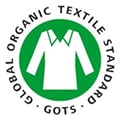 The Global Organic Textile Standard or GOTS is the gold-standard in the eco-fashion world. The certification lays out environmental requirements from end-to-end for input materials, processing, dyeing and waste systems. It also requires a basic set of social justice criteria be met. So GOTS certified products meet a level of wage and working standards. You can be sure that anything GOTS certified has no child labor or sweatshop conditions.
The Global Organic Textile Standard or GOTS is the gold-standard in the eco-fashion world. The certification lays out environmental requirements from end-to-end for input materials, processing, dyeing and waste systems. It also requires a basic set of social justice criteria be met. So GOTS certified products meet a level of wage and working standards. You can be sure that anything GOTS certified has no child labor or sweatshop conditions.
In some cases, you'll see Made with GOTS Certified Fabric or Yarn. Our own in-house brand, Green Tree Organic has this label. We design, cut and sew in the USA, but we import our fabric from India. To ensure our fabrics meet environmental and social justice criteria, we purchase only GOTS certified fabrics. However, we do not pay to have the GOTS certification on the final product here in the USA. This is fairly common in countries with stringent workers rights laws already in place.- Oeko-Tex 100
 The OEKO-TEX® 100 standard is used to ensure that a final article of clothing is completely free of carcinogens, toxins and chemicals that are harmful to humans. Some of our clothing cannot be certified organic, either because a particular crop does not fall under organic standards management or because the items is made from recycled materials. For those items, OEKO-TEX® 100 provides peace of mind that your item is safe from harmful substances.
The OEKO-TEX® 100 standard is used to ensure that a final article of clothing is completely free of carcinogens, toxins and chemicals that are harmful to humans. Some of our clothing cannot be certified organic, either because a particular crop does not fall under organic standards management or because the items is made from recycled materials. For those items, OEKO-TEX® 100 provides peace of mind that your item is safe from harmful substances.
Oeko-Tex testing for harmful substances includes:- illegal substances
- legally regulated substances
- known harmful (but not legally regulated) chemicals
- as well as parameters for health care
- Made in Green
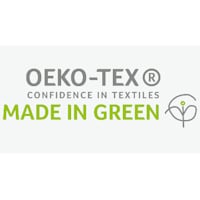 Made in Green by OEKO-TEX® is an independent textile label for highlighting consumer products and semi-finished products at all levels of the textile chain that are made from materials tested for harmful substances and that have been manufactured by using environmentally friendly processes and under safe and socially responsible working conditions.
Made in Green by OEKO-TEX® is an independent textile label for highlighting consumer products and semi-finished products at all levels of the textile chain that are made from materials tested for harmful substances and that have been manufactured by using environmentally friendly processes and under safe and socially responsible working conditions.
The Made in Green by OEKO-TEX® label shows the consumer that the textiles concerned are tested for harmful substances and sustainably produced in accordance with OEKO-TEX® guidelines.- Bluesign
 The independent bluesign® system pursues the unique approach to minimize the environmental impact throughout the production process. The so-called Input Stream Management ensures that all during the production process applied substances and raw materials are already verified in advance of the production. In other words: Instead of testing finished products bluesign® system is applied at the point where the production starts. This means, that suppliers, manufacturers, retailers and brands have to go through rigorous tests in order to verify compliance with bluesign® criteria.
The independent bluesign® system pursues the unique approach to minimize the environmental impact throughout the production process. The so-called Input Stream Management ensures that all during the production process applied substances and raw materials are already verified in advance of the production. In other words: Instead of testing finished products bluesign® system is applied at the point where the production starts. This means, that suppliers, manufacturers, retailers and brands have to go through rigorous tests in order to verify compliance with bluesign® criteria.
The bluesign® system is based on five principles:- Resource productivity
- Consumer safety
- Water emission
- Air emission
- Occupational health & safety
- Fair Trade
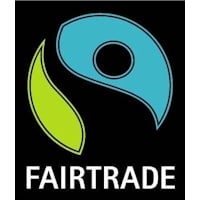 Fairtrade International (FLO) sets international fair trade standards to certify that specific products and brands are fair trade. Fairtrade is an alternative approach to conventional trade and is based on a partnership between producers and consumers. When farmers can sell on Fairtrade terms, it provides them with a better deal and improved terms of trade. This allows them the opportunity to improve their lives and plan for their future. Fairtrade offers consumers a powerful way to reduce poverty through their every day shopping. The Fairtrade International logo to the left is the most common one found on fair trade clothing outside of the USA.
Fairtrade International (FLO) sets international fair trade standards to certify that specific products and brands are fair trade. Fairtrade is an alternative approach to conventional trade and is based on a partnership between producers and consumers. When farmers can sell on Fairtrade terms, it provides them with a better deal and improved terms of trade. This allows them the opportunity to improve their lives and plan for their future. Fairtrade offers consumers a powerful way to reduce poverty through their every day shopping. The Fairtrade International logo to the left is the most common one found on fair trade clothing outside of the USA. - ICEA
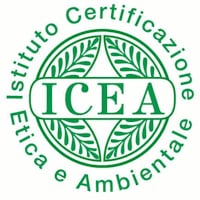 ICEA or Istituto Certificazione Etica e Ambientale, is the Italian certifying agency for sustainable clothing. ICEA is affiliated with the broader GOTS program and meets all criteria laid out by GOTS. We called this one out separately because Love Nature, one of our largest suppliers, has all of their items certified by ICEA.
ICEA or Istituto Certificazione Etica e Ambientale, is the Italian certifying agency for sustainable clothing. ICEA is affiliated with the broader GOTS program and meets all criteria laid out by GOTS. We called this one out separately because Love Nature, one of our largest suppliers, has all of their items certified by ICEA.- Made in the USA
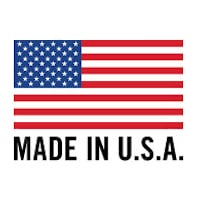 Made in the USA is not actually a third party certification. However, so many of customers have asked us to more clearly identify products that support the USA economy. Made in the USA indicates that the cutting and sewing of the garment were done here. Please note, however, that in many cases the fabric is still imported. Hemp for example, which is arguably the most eco-friendly fabric available today, is still illegal to grow in the USA as of 2016. Also, the USA does not grow enough organic cotton to meet its own demand, so most organically grown cotton, or organic cotton fabric, is imported from India and Turkey. Still the domestic garment industry gets an enormous boost from products that are designed and sewn in the USA.
Made in the USA is not actually a third party certification. However, so many of customers have asked us to more clearly identify products that support the USA economy. Made in the USA indicates that the cutting and sewing of the garment were done here. Please note, however, that in many cases the fabric is still imported. Hemp for example, which is arguably the most eco-friendly fabric available today, is still illegal to grow in the USA as of 2016. Also, the USA does not grow enough organic cotton to meet its own demand, so most organically grown cotton, or organic cotton fabric, is imported from India and Turkey. Still the domestic garment industry gets an enormous boost from products that are designed and sewn in the USA.
Special Orders
We stock all of our inventory in order to get your products to you as quickly as possible. However, if you see a particular clothing item, color or size from one of our manufacturers that we don't currently carry, let us know and we will try to special order it for you. We offer 10% off the manufacturer's retail price on almost every item we stock from US manufacturers. We will honor that policy for special orders as well. Special orders take between 1-4 weeks depending on the item(s) being ordered. Our free shipping offer on orders over $99 is good on special orders as long as your entire order is shipped together. If you are special ordering more than one product, and would like free shipping, the order will be held until all items are received in-house.
Special orders require 50% deposit upfront with the remainder charged upon shipment. Some special order items may not returnable. We will notify you prior to charging the deposit if this is the case.
